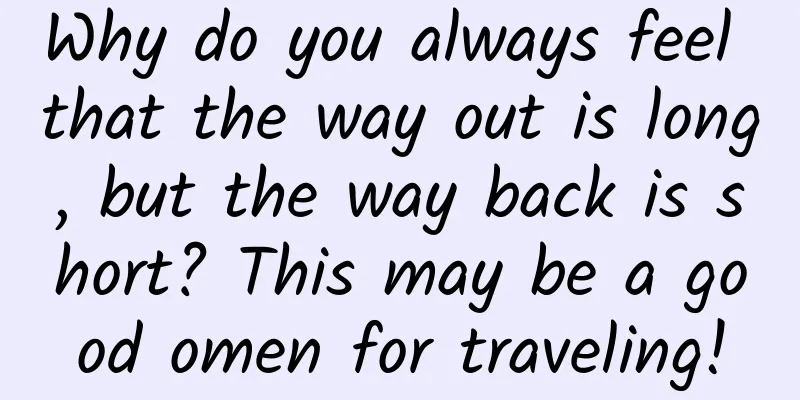Why do you always feel that the way out is long, but the way back is short? This may be a good omen for traveling!

|
"Why hasn't it arrived yet?" "How far is it?" "Why does this journey take so long?" … You may have had the same experience when traveling: the destination seems to be very close when you are there, but it seems to be far away in time. What is even more strange is that even though the route is the same, the return trip always feels much faster than the trip there, as if you took a shortcut. This wonderful phenomenon of "the journey is long, the return is short" is likely to be a good sign that you will have a wonderful holiday trip ~ “The journey is long, but the return is near” What exactly is this feeling? When you go to a strange place and then come back, even though you have walked the same distance, the time you spend back always seems to be much shorter than the time you first traveled. This strange feeling has a professional term for it, called the return trip effect . It means that even if the outbound and return distances are the same objectively, we subjectively feel that the distance to the destination is longer than the distance back from the destination. Many scientists have also developed a keen interest in this strange phenomenon that often occurs in life. Ryosuke Ozawa of Kyoto University published a research experiment in the journal Public Library of Science Comprehensive and found that the return trip effect does exist, and it does not affect the time mechanism itself, but our feeling of time afterwards. The experimenters divided 20 participants into two groups and had them watch three "hiking" videos of equal length and distance (26.3 minutes, 1.7 kilometers). Video 1 was the route from "S" to "E", Video 2 was the return trip from "S" to "E", and Video 3 was a completely different route. In the experiment, 10 participants formed the round-trip group and watched either Video 1 or 2 each time. The other group consisted of another 10 participants, who watched either Video 2 or 3 each time. Subsequent scoring of participant feedback revealed that although objectively the duration and distance of the videos were exactly the same, participants who watched the round-trip video thought the return video took less time. Image source: pexels What causes the "return trip effect"? 1 Familiarity In an article published in the journal Social Psychological and Personality Science, University of Miami psychologist Zoey Chen proposed a familiarity-related explanation for the return trip effect. With experience, we believe that everything will develop smoothly and in a straight line. When we do something for the first time, we feel uneasy because of our lack of experience, and think that the next thing may be a curve with episodes. This leads to people feeling that it takes less time to do familiar things than to do unfamiliar things. When we travel to an unfamiliar place, we tend to think that something unexpected will happen because of the unknown. But when we return, we are familiar with the route, so we have the illusion that time has sped up. 2 Expectation Building Although the return trip effect may indeed be related to familiarity, many studies have found that people will still experience the "return trip effect" even when the round-trip routes are completely different. A study published in the journal Psychonomic Bulletin and Review found that 97 college students cycled to a forest clearing. Two hours later, one-third of them returned by the same route, while the rest returned by a different route of the same length. Although all routes only take 35 minutes, the researchers found that "no matter which route students chose to return, they reported that it was about 22% shorter than their original trip." Psychologists believe that this phenomenon is likely related to people's emotions and "expectations". People often underestimate the time it takes to do something. When embarking on an unfamiliar journey, we will be affected by the overall expectations, curiosity, anxiety, impatience and other emotions of the trip, and have the illusion that "a 1-hour journey is much longer than usual". This is the establishment of expectations. On the return trip, we know that our destination is home, and most of the time we are not too excited about "going home". This allows us to feel the real time with a more stable mentality , so there will be a deviation from the previous expectations. On the one hand, we think that "time may be very long", and on the other hand, the real time perception returns to normal due to the elimination of emotional influence, which leads to the return trip effect. Image source: pexels In addition, researchers pointed out that emotions and expectations can sometimes even reverse the effect of the return trip effect. This is because expectations can increase arousal and attention, giving people the illusion of extended time. So if you feel no interest in the upcoming trip, or even want to go home quickly, then you are likely to experience the reversed return trip effect of "the journey is short, the return is long". So, although the return trip effect during travel can be very tiring at times, it also means that we have high expectations and interest in the entire journey ahead. So, in a sense, if you experience the return trip effect during your next trip, it is likely that you will have a wonderful and happy holiday life. References [1] Chen, Z., Hamilton, R., & Rucker, DD (2020). Are we there yet? An anticipation account of the return trip effect. Social Psychology and Personality Science. Advance online publication. DOI: 10.1177/1948550620916054 [2] Ozawa R, Fujii K, Kouzaki M (2015) Correction: The Return Trip Is Felt Shorter Only Postdictively: A Psychophysiological Study of the Return Trip Effect. PLOS ONE 10(7): e0133339. https://doi.org/10.1371/journal.pone.0133339 Planning and production Author: Su Yi, deputy director of the National Psychological Service Grassroots Collaboration Network Media Development Center, and a psychotherapist Reviewer: Fan Chunlei, Associate Researcher, Institute of Psychology, Chinese Academy of Sciences Planning|Yue Yisong and Yang Yaping Editor|Yang Yaping |
<<: Science in Poetry | How is time “seen” as the seasons change?
Recommend
Why does "couple cancer" occur? The "killer" behind it is ignored by many people
Today, the topic is "A couple both got cance...
Pinduoduo activities attract new growth matrix!
From time to time, you can see some screen-sweepi...
When it comes to eating and drinking, you are not even as good as them.
Spider? Drinking? Whose research is so bizarre? I...
The legendary bird is as stable as an old bird? Even a hurricane can't disrupt the flight path of this bird
□ Chen Xiaodong It is the breeding season for Sou...
Facing Skyworth's paper-thin OLED TV, can Hisense, which sticks to ULED, have the last laugh?
At present, the most intense competition in TV pa...
Industrial Application and Trends of IP in 2020
Under the sudden outbreak of the epidemic, many b...
5 strategies for Facebook advertising!
Want to improve your Facebook advertising perform...
How much does it cost to customize a logistics mini program in Anqing?
According to industry insiders, mini programs wil...
3 tips for refined operation strategies!
As the cost of acquiring traffic gradually increa...
Foxconn is cost-sensitive. How does the United States attract it to invest in building factories?
On July 26, Foxconn Technology Group Chairman Ter...
2020 China Internet Advertising Trend Report!
In previous sharing, we said that 2019 is the fir...
How to use the points system to stimulate user retention
A reasonable points system generally consists of ...
A preview of the top five trends on Xiaohongshu during Double Eleven!
The closing ceremony of the Tokyo Olympics ended ...
Solid info! 10 common methods to expand Baidu bidding in 2021
In fact, the concept of grabbing volume has exist...
Difficulties in JavaScript from the perspective of direction
Preface Before we start writing, let's first ...









